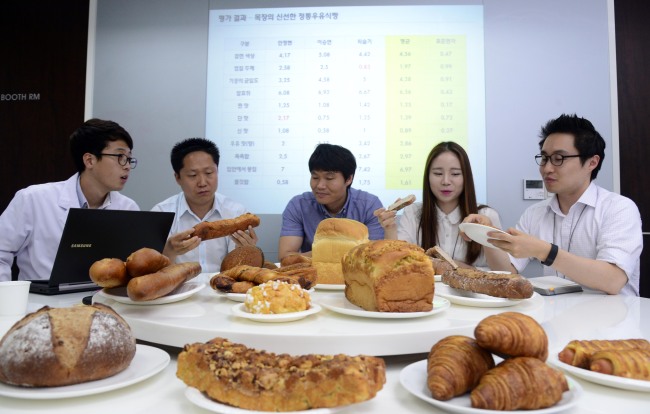On a Thursday afternoon, seven staff members of SPC Group gathered at a meeting room and began to sniff and observe a baguette.
“Do you see these cracks? And it smells a bit sour and the sound of the bread cracking is a bit too hard. I think the dough went a bit too far,” said Ahn Kyoung-ho, a member of Paris Croissant’s technical training team. “This happens when the bread is a bit overbaked,” he added. Lee Doo-won, a researcher at the SPC Sensory Lab, took it down.
Then the attendants began discussing the colors and tastes of a loaf of toasted bread, a peach cream bread and a castella spongecake. They ripped, poked, twisted and chewed the bread and pastries and began to call out numbers. “I think the chewiness is about a three,” “I think the color is closer to a two than a three,” they said, and Lee took all the notes.
This rather bizarre scene is a part of the weekly meeting of the “taste standardization committee,” which monitors the quality of nearly all SPC products.
Since 2013, staff from different departments, regardless of their expertise, gather at the Sensory Lab to test randomly selected breads and pastries from the actual store shelves of SPC’s No. 1 bakery franchise Paris Baguette, Paris Croissant and Passion 5 as well as cafe franchises Cafe Pascucci and Queens Park alongside Baskin Robbins, Dunkin Donuts, Jamba Juice and La Grillia and mass-produced pastry brands Shany, Samlip and many more.
The staff use all their senses ― touch, smell, taste, hearing and sight ― to discern whether the products are well qualified to stay on the store shelves.

SPC 센소니. 박해묵 기자/mook@heraldcorp.comMembers of SPC Group’s taste standardization committee evaluate the company’s bread and pastries at the Sensory Lab in southern Seoul on July 16. Park Hae-mook/The Korea Herald
As part of sensory training, the members are taken to a room, separated from one another, and provided with samples through a small door and asked to rate the tastes ― sweetness, acidity, savoriness and bitterness ― on a computer screen. Once one inserts the numbers, the screen gives the outcome, rectifying the scales and standardizing the tastes.
The committee also has quantified the elasticity, colors, shape of the dough and the final products to the assessment factors. “We also have a consumer panel who taste our products on a regular basis. We combine the comments and report it to the headquarters for quality control,” Lee said.
“It is not easy, but this is part of how we make sure that our products keep their originality in the market,” he added.
SPC Group reported more than 4 trillion won ($3.7 billion) in sales last year. The company’s flagship bakery brand Paris Baguette went global in 2004, running a total of 184 overseas stores in the U.S., France, China, Vietnam and Singapore, on top of more than 3,000 domestic stores. SPC expects sales to reach 6 trillion won by the end of the year.
By Bae Ji-sook (baejisook@heraldcorp.com)



![[KH Explains] No more 'Michael' at Kakao Games](http://res.heraldm.com/phpwas/restmb_idxmake.php?idx=645&simg=/content/image/2024/04/28/20240428050183_0.jpg&u=20240428180321)


